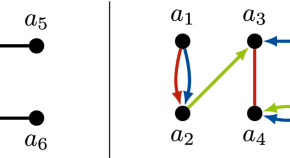
Collection
Fair Public Decision Making: Allocating Budgets, Seats, and Probability
- Submission status
- Closed
A current trend in social choice theory is to study new models that have the flavor of both collective decision-making and fair division. Examples include multi-winner elections (which are concerned with the composition of committees of a fixed size), participatory budgeting (which deals with the allocation of a public budget among various projects), and probabilistic social choice (which studies voting rules that allow for lotteries as outcomes).
The unifying theme of these settings is that a society of agents aims at collectively deciding on the allocation of some — divisible or indivisible — public resource, such as money, time, seats, or probability, to various possible entities such as candidates, projects, activities, or parties (but not to the agents themselves). This distinguishes them from other well-studied topics in the social choice literature, such as fair division, single-winner voting, and matching. The basis for the collective decisions are the preferences of the individual agents, and a common obstacle in the design of attractive allocation rules is the perpetual conflict among efficiency, strategyproofness, and fairness.
Some of the settings described above are especially popular in the computational social choice community. However, we solicit submissions from all backgrounds and no computational study is required. The goal of this special issue is to put together a collection of high-quality articles with the overarching theme of fair public decision making.
The potential list of topics includes (but is not limited to):
- Apportionment
- Multi-winner elections
- Participatory budgeting
- Donor coordination
- Probabilistic social choice
- Sortition
- Multiple referenda
Editors
-
Haris Aziz
University of New South Wales, Australia
-
Felix Brandt
Technical University of Munich, Germany
-
Edith Elkind
Oxford University, UK
-
Jérôme Lang
Université Paris-Dauphine, France
Articles (4 in this collection)
-

-
Approval-based shortlisting
Authors
- Martin Lackner
- Jan Maly
- Content type: Original Paper
- Open Access
- Published: 11 August 2023

-
A general framework for participatory budgeting with additional constraints
Authors
- Simon Rey
- Ulle Endriss
- Ronald de Haan
- Content type: Original Paper
- Open Access
- Published: 07 July 2023

-
Proportional representation in matching markets: selecting multiple matchings under dichotomous preferences
Authors
- Niclas Boehmer
- Markus Brill
- Ulrike Schmidt-Kraepelin
- Content type: Original Paper
- Open Access
- Published: 05 April 2023



